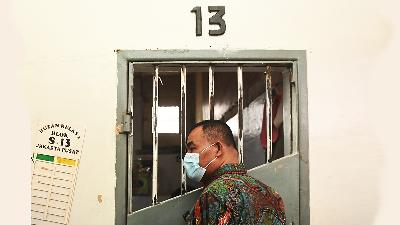A Forgotten National Asset in Our Ecosystem
Monday, December 2, 2024
A total of 117 lakes in West Java and Banten are shrinking, or even disappearing. These national assets should not be forgotten.
arsip tempo : 174496253041.

SITU, as small lakes in the western part of Java are known, are part of the freshwater ecosystem, but often escape attention. These curved bodies of water have never been recorded as state assets because they formed naturally, without any proof of ownership. As a result, many of them are not maintained, and sediment builds up until they become ordinary land. After that, they are turned into areas for housing, gardens or even trash dumps, almost as if this is unavoidable.
Of the 686 lakes in Indonesia, almost two thirds are in West Java and Banten. Unfortunately, the Corruption Eradication Commission’s National Corruption Prevention team has found that 117 of these have shrunk, or even disappeared. Of the 30 lakes that were studied, many of them have passed into private hands. The losses to the state are immediately apparent.
One example is Lake Pasir Putih in Depok, West Java. From an original 8 hectares, all that remains of this lake is a water channel the width of a road. The rest has become housing and empty land. The same has happened to nearby Lake Krukut. Some of the area formerly covered by this lake has become housing, factories and a toll road.
The loss of a lake does not only have an impact on the environment. Sometimes it leads to agrarian conflict. For example, at Lake Rompong, Tangerang, Banten, 23 people who have been trading in that area for more than 25 years were reported for illegally seizing land. There is a similar problem at Lake Sarkanjut, Garut, West Java, because public facilities such as a school and the village office have been built on land formerly covered by the lake.
More seriously, the loss of lakes that formerly served as water catchment and flood control areas often leads to disaster. The flooding that hit Jakarta on January 1, 2020, was a harsh warning. Heavy rain triggered flooding in all five regions of the capital city leading to nine deaths and forcing more than 31,000 people to leave their homes. After this incident, the Ciliwung Cisadane River Management Office announced that 15 lakes around Jakarta had vanished.
Efforts by the Public Works and People’s Housing Ministry to restore these lakes by marking boundaries should be appreciated. These boundaries, marking out protected areas 50 meters from the edges of lakes have proved an effective way to protect and preserve the water storage capacity. And similar measures carried out with eight national priority lakes have shown the success of this action.
In order to fill the legal vacuum regarding the management of these natural resources, the State Asset Management Bill needs to be immediately passed into law. The Legislation Body at the House of Representatives should make this bill a priority in the 2024-2029 National Legislation Program.
However, there can be no half measures in the endeavor to save lakes. The collection of accurate data and in-depth analysis must form the basis for policy, including the designation of land formerly covered by lakes as state assets. Meanwhile, the government must provide a fair compensation scheme for people who already hold land deeds on such former lakes.
Protecting lakes means protecting the environment. If lakes continue to be allowed to disappear, the threat of ecological disaster and losses to the state will only increase.











